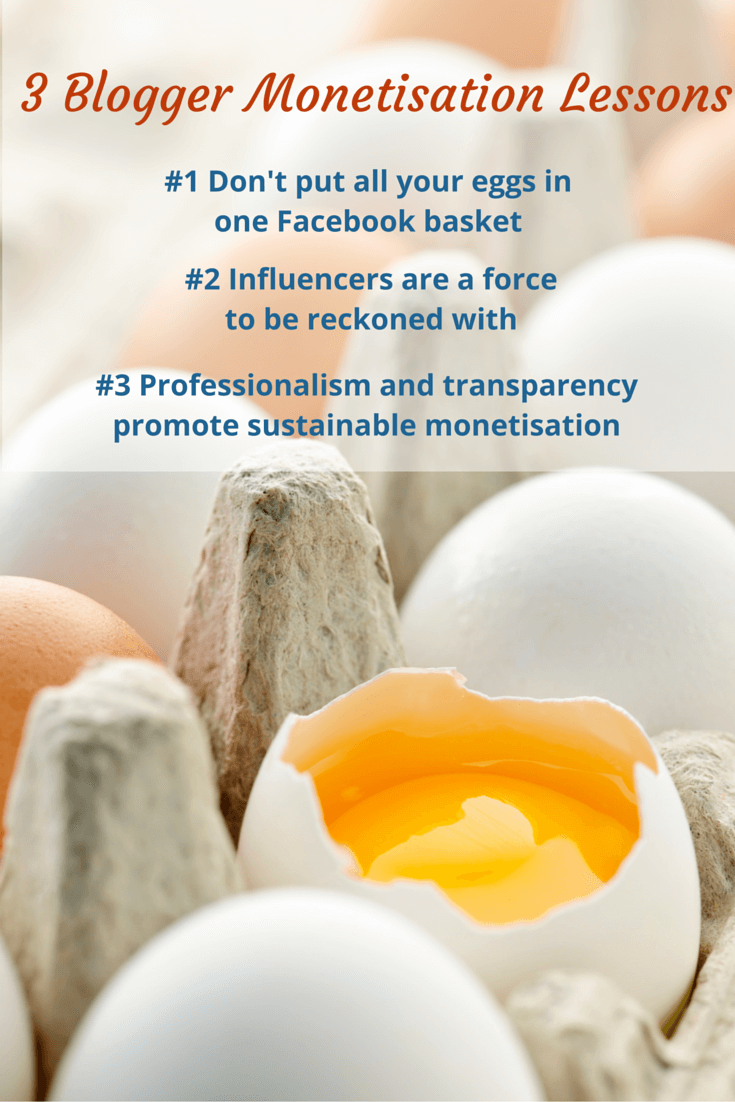
So apparently the (Facebook blue) sky fell and then picked itself back up again, but not before everyone went completely bananas over yet another policy update.
It doesn't really matter what the policy update is this time (although we'll get to that, and key lessons, soon). The more interesting thing to ponder is why does everyone go bananas? It's because anyone with an investment of time and content in a Facebook page is essentially on 'rented' space, and Facebook has all the control
So, when Facebook changes the game we all cry foul, insist on how unfair it is, and despair in how the platform (which we didn't build or actually pay rent to use), is impacting on our livelihoods.
Lesson #1: Don't put all your eggs in one basket.
It's the golden rule of blog monetisation – diversification of risk. You don't own social, but you can own an email list.
For more articles and ProBlogger advice see:
In reality, many Facebook page owners could be considered mere squatters, using Facebook property for our own gain and not generating any revenue for the platform (surely not?!).
Sounds a bit extreme (and yes, there are ways your content and the eyeball it brings indirectly benefits Facebook), but that's exactly what many pages have been doing, and up until now, Facebook has been turning a blind eye.
This time the kerfuffle is around the topic of "branded content", specifically who can post it and under what conditions.
What was the situation before the Facebook branded content policy update?
Before we look at the policy update in a bit more detail, here's a recap on what the Facebook page guidelines were before the recent change:
"Advertising on Pages: Third-party advertisements on Pages are prohibited, without our prior permission."
That was it, pretty straight-forward and simple. In fact almost all Facebook policy is thus, yet we spend so much time trying to read into it and interpret it to benefit our needs.
So, that social 'shoutout' you charged a brand for? Breaking the rules.
Posting a competition for your readers sponsored by a brand on your page? Breaking the rules (actually you might have been breaking more than one set of rules if you didn't know your way around the Facebook Promotions policy III. E.)
Essentially, what most bloggers were doing before this update, was in contradiction to Facebook rules. However, the even bigger contradiction (or is it?) is that Facebook itself has been approving ad spend on these posts, essentially approving the behaviour.
Or is that just their way of giving their 'prior permission'? "Oh you want to pay us? Great, thanks, approved". Again, simple rule with a simple implementation.
This approval of ad spend is in line with other advice many bloggers refer to along the lines of "it's ok to charge brands for a sponsored post as long as it's part of a "wider campaign of activity" / "paid FB ad campaign" / "existing relevant relationship with the third-party" (all of which have been bandied about to justify the activity). And, so long as Facebook are approving the spend on those posts, it seems all is ok.
Where it probably hasn't been ok (and hasn't been enforced by Facebook until now) is the rise of influencers charging for branded content and not putting any spend behind it.
What has changed since Facebook's branded content policy update?
Really, not much has changed. Facebook are now just enforcing their policy and lining up some extra hoops to jump through to ensure they're not missing out on the growth in 'sponsored social'.
Branded content on Pages is only allowed from Verified Pages (with the blue badge) on Facebook and must adhere to the following policies. Branded content on Pages is defined as content originating from a Page owner that features third party products, brands, or sponsors that are different from the Page owner. When posting non-prohibited branded content integrations, Pages must use the Branded Content tool to tag the featured third party product, brand, or sponsor.
The policy update then goes on to describe prohibited and non-prohibited types of branded content.
This move starts at the top with the big influencers, and by big, think along the lines of examples like the below cited in Adweek:
"Kendall Jenner, Selena Gomez, Taylor Swift and Cara Delevigne are all worth $230,000 per social media post when the message appears across Facebook, Instagram and Twitter, D’Marie told Adweek. The celebrities represent a sample, according to D’Marie, of the top 2 percent of social influencers—which includes numerous other big names who can ask for $230,000 per post."
Celebrities are also notorious for not disclosing product placement and sponsored mentions in their social media posts. Facebook's move to enforce tagging the mentioned brand actually serves two purposes:
- Ensuring some kind of disclosure, in line with FTC rulings
- Notifying the brand of the mention, giving them access to the post performance and enabling them to put advertising spend behind the post
Lesson #2: The rise of the influencer is a force to be reckoned with
This is a very positive development and one that not only recognises the strength of influencers, but also the importance of disclosure and trust – the basis of influencer credibility and their value to marketers and brands. Any mechanism that promotes better disclosure and trust can only be a positive step in the long term viability of monetisation of influence.
What does this mean for the non-verified majority?
Facebook clearly do not think that the majority of bloggers are in this Celebrity/Influencer category (yet), and have reserved the special treatment for verified pages only.
That little word 'only' seems to be the one responsible for getting a lot of bloggers worked up over the past couple of days.
"Branded content on Pages is only allowed from Verified Pages (with the blue badge) on Facebook and must adhere to the following policies." (Emphasis is mine)
Many have, understandably, taken this to mean that non-verified pages are not allowed to post branded content. But guess what? You weren't anyway, unless given prior permission by Facebook. For non-verified pages this leaves two possible courses of action:
- Get verified
- Always attach a spend to branded content posts to get Facebook approval, and only start worrying when they don't give it.
There are a number of blog posts flying around the internet that have tried to clarify this in more detail, including relating conversations with Facebook representatives.
You can read more of those here:
(Note: these are individual interpretations and not official advice from Facebook or ProBlogger)
More than likely the recent changes and introduction of the branded content tagging tool will trickle down to all pages, which means it's a good idea to familiarise yourself with the implications of the new policy.
Why the new branded content policy is a positive move for bloggers/influencers
Other than to ensure Facebook gets a slice of the sponsored mentions pie, the policy also helps to ensure there is more quality content in our news feeds. As mentioned in the recent announcement about the update from Facebook,
"People have told us that they find some types of branded content to be less engaging than others, and this was typically when the content was more promotional."
They're also citing transparency as another key motivator for the update:
"For brands and businesses, the new tool will introduce more transparency and allow them to better understand how their marketing initiatives are performing across Facebook."
Both reasons are reflective of a healthy and sustainable approach to the monetisation of influence. It ensures an influencer is more likely to produce/promote good quality content for their audience, rather than shilling overly promotional garbage to make a quick buck (read as: not selling out).
It also holds influencers accountable for what they're charging marketers and brands to access their audience. With marketers and brands now getting direct access to post performance and insights, gone are the smoke and mirrors of vanity metrics and (we can only hope this doesn't happen) false reporting of campaign results.
Lesson #3: Professionalism and transparency promote sustainable monetisation
You may not feel like accountability is a good thing, but in the long run it is. It holds influencers responsible for setting realistic expectations, charging accordingly and it weeds out those trying to make a quick buck from over-inflated audiences (ie buying fake followers) and giving the majority a bad name with marketers.

So, in summary:
- No need to freak out, the sky isn't falling
- Don't put all your eggs in one Facebook basket (and this probably applies to Instagram too)
- Don't be afraid of being non-verified, it's essentially business as usual as long as you're not breaking the rules that were always there
- Don't be afraid of being verified and being held accountable, it's a positive step towards sustainable monetisation of your influence
What are your thoughts on the update? How does it affect you and the way you monetise?
Laney Galligan is General Manager of ProBlogger and the founder and director of Agents of Influence, a service helping online creative understand, build and leverage their influence. When she's not helping people earning a living from their passion (or on Slack with the PB team), you'll find her on the roller derby track or spinning a hula hoop.
The post 3 Blogger Monetisation Lessons from Facebook’s Branded Content Policy Update appeared first on ProBlogger.






